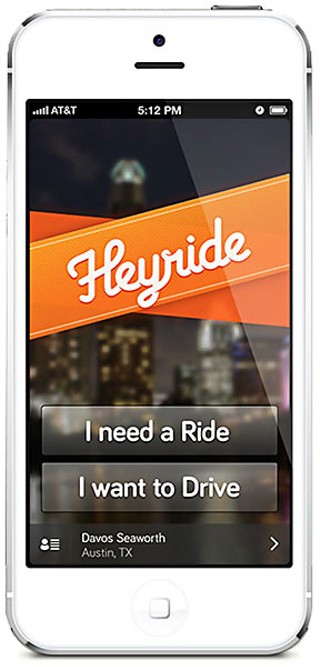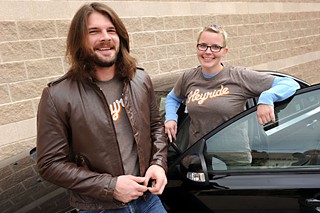Going Places
By merging technology and old-school community building, Heyride just may revolutionize how you get from here to there
By Dan Solomon, Fri., Nov. 23, 2012
Like most good ideas, Josh Huck conceived of the company he founded, Heyride, while he was exhausted. After crossing through the morass of bodies Downtown during SXSW this past March, Huck found himself on a stretch of West Fifth, trying to get home and unable to hail one of the limited number of available cabs. And then he saw the guy in the Volvo.
"I was so tired at that point, I just wanted to go home," the 31-year-old Huck recalls as he sips a Topo Chico in Heyride's office on the ground floor of a Victorian-style house in East Austin. "I remember looking across the street, and there's this guy in a Volvo. He looks totally normal, and I was wondering, because I couldn't get a cab – it would be really cool if I could just walk up, go to the window, and be like, 'Hey, man. I'm a reasonable guy, you seem like a reasonable guy. Maybe I could give you ten bucks and you could give me a ride home?'"
Huck accepted that, late at night on a street packed with an international crowd of drunk people, most motorists would prefer not to encounter a stranger knocking on their window, and he found his own way home. Instead, he came up with an idea for an app that helps turn smartphone owners into part-time cabbies and taps into one of Austin's greatest unused resources – each other – when trying to solve the mess that is late-night Downtown transportation.
It's not really a controversial statement to say that getting to and from Downtown late at night safely and efficiently is one of the bigger inconveniences of Austin life. Capital Metro has expanded the hours and routes of late-night buses over the years, but the appeal of riding a slow-moving bus full of people who've been partying on Sixth Street until two in the morning is understandably limited. Taxi service is unreliable and can get expensive, especially for people who live outside of Central Austin. Public parking is limited, and while the addition of late-night meters has helped encourage turnover of prime spots, there's still not anywhere near enough to go around. Private lots offer more options, but you can't leave your car there all night – which means if you've had too much to drink, you're either driving home drunk or your car's going to be towed.
For Huck, who serves as the company's CEO, Heyride (www.heyride.com) is an attempt to mitigate that problem by turning everybody with an iPhone into both a carpool passenger and a cabdriver. (An Android version is under development and should be available in early 2013.) The way it works is pretty simple: Users sign up for the service, and when they open the app, decide if they want to drive or if they want a ride. (Drivers have to pass a background check to be fully verified for the service.) Riders enter their destination from their current location, and the app determines an appropriate minimum dollar value for the trip. Drivers are notified every time a ride is requested, and can offer to make the trip for an agreed-upon rate. When the rider accepts an offer, the driver is notified and given precise directions. The rider can track the driver's location using the phone's GPS, and then hops in the car when the driver arrives. At the end of the trip, they push the payment button, and the driver is paid via stored credit card information. Heyride takes a 20% cut, and the users part ways.
Right now, Huck says, the app is mostly used to solve the late-night transportation dilemma, and the company has signed up to 500 riders since its soft launch in late October. But the experience of using Heyride quickly opens up the potential of the service to be more than just an amateur taxi service. Once you start giving and getting rides, it's hard not to realize that you're involved in some pleasant, neighborly transactions with a bunch of people who'd otherwise be strangers – and the value of that is surprising. Heyride may or may not eventually help provide a real solution to the transportation woes that have plagued Austin for years, but it can definitely help build a community.
Every few months, a media theorist explains that technology is making us lonely, less human, and more alienated. Think Stephen Marche's cover story for The Atlantic earlier this year, "Is Facebook Making Us Lonely?," or TED speaker Sherry Turkle's book Alone Together: Why We Expect More From Technology and Less From Each Other. It's a common theme in contemporary society – that our phones and Twitter accounts and digital lives only create the illusion of intimacy, while the real meat-and-guts humans behind them grow increasingly distant from one another. It's compelling, and it may even be true.
Maybe technology really is alienating us from one another; maybe social media is training a generation to feel comfortable posting, "Wish I had enough eggs to make cookies!" on their Facebook pages, but uncomfortable knocking on a door across the street to actually ask for an egg. But if that's the case, then technologies like Heyride – or the Austin-based vacation rental service HomeAway, or its competitor Airbnb, or similar services – seem to help balance that out. A person might not be prepared to ask a neighbor for a ride to the mechanic's shop, but if that neighbor is on Heyride, then they can trade rides through the service – and maybe, eventually, the service won't even be necessary. You can see these technologies helping people relearn all sorts of interdependent, community-minded behaviors. Maybe in three years, someone will launch Eggschange.com, where people actually can borrow baking ingredients from people who live nearby.
Douglas Rushkoff has given a lot of thought to the way our relationships to one another have changed in a digital age dominated by corporate culture, and his conclusions have rarely been as cut-and-dried – or as gloomy – as Marche's or Turkle's. As the author of the books Life Inc. and Program or Be Programmed: Ten Commands for a Digital Age, Rushkoff has spent years exploring the intersection between communities, technology, and commerce, and he finds collaborative models like Heyride to have a lot of potential. "The game-changing element of this is if it breaks down production monopolies that have characterized the industrial age since there was an industrial age," Rushkoff says. "It allows producers to reach consumers in decentralized ways – you don't need Hertz, or Central Taxi, to create a sense of trust and legitimacy to the transaction. All of these things are promoting a peer-to-peer society, and that's all good."
Rushkoff also rejects the notion that it's social networking, or the Internet at large, that's responsible for the sense of alienation that so many theorists see as the result of our current relationship to technology. "Most of the stories that are pining over the influence of the Internet are really stories that should be pining over the influence of corporate capitalism on our culture," he says. "When kids use the product of a Fortune 500 company to assemble their identities, which is really what you're seeing with Facebook, you're going to see some negative effects. That has almost nothing to do with technology, and a whole lot to do with people's ignorance of how these technologies work."
In other words, the technology is just a tool. In the hands of Facebook – whose business model is to monetize its users existing personal relationships and deliver those users to the companies who pay it for promotion – that tool can warp our sense of how we connect with one another. In the hands of Heyride, which makes its money by facilitating communication between strangers who need or are offering rides, it's harder to see the dark side.
"I look at most of these things as tools to reacquaint communities with the lost art of sharing and peer-to-peer exchange," Rushkoff says. "The things that were systematically and intentionally removed from our culture by advertising and corporate sales departments. A society that exchanges with itself is much harder to victimize than one in which people don't trust each other."
Talking about the transformative nature of the microeconomies facilitated by small companies, and how they help eliminate the need for larger, centralized, corporate service providers in certain cases, makes Heyride seem especially impressive. But that's also such a grand way of thinking about the idea that it feels disconnected from the process of using an iPhone app that's designed to make it easier for people to hop into strangers' cars. The question is, how does the actual experience of using Heyride deliver on the potential that the service carries?
The first time I use Heyride, I'm at home in the early evening when I get a notification that Brian R. is looking for a ride from East Seventh to the Flying Saucer in the Triangle. I'm not busy, so I open the app to offer Brian the ride at the minimum dollar amount.
Brian R. is Brian Romanko, and he's Heyride's chief technology officer. In the early weeks of the service, the Heyride team requested a lot of rides, to troubleshoot and to ensure that the users had both drivers and passengers at their disposal.

Romanko tells me when I pick him up that other users had offered him a ride, but that he picked me because he'd never ridden in a convertible before. We take Chicon most of the way so that he can enjoy the experience without the hassle of I-35, and chat about the visible changes to a stretch of East Austin that's been notoriously shady for most of the time both of us have lived in the city. I'd never met him before, and a 20-minute car ride at rush hour wasn't enough to make me feel like Brian and I were friends – but it was easy to imagine that we might have been friends, if we'd known each other longer. If I had met Brian three years ago, and he needed a ride to a bar after work, I wouldn't have thought twice about offering it to him if he asked. Especially if I knew that I could count on him for a ride Downtown later on.
Brian's not the guy who makes the first offer when I request a ride a few days later, though. Instead, about two minutes after logging into the app and entering my destination, I receive a notification that Blade M. has offered to fulfill my ride request, and that he's coming from Sixth and Lamar, about 15 minutes away.
Blade M. is Blade McGunn, and he's going to take me from Hyde Park down to Auditorium Shores during Fun Fun Fun Fest. McGunn has been in Austin for less than a month – when he picks me up, he needs to be told which way Guadalupe is – and he's driving with Heyride to meet people and to learn the city's neighborhoods before he takes his Texas Real Estate Commission exam to become a licensed realtor. So far, the service is working out for him – McGunn has given dozens of Heyrides since the soft launch on Oct. 26.
I feel comfortable riding alongside McGunn. I sit in the front seat, which everyone who uses Heyride seems to do, because sitting in the back would be awkward, and we chat about the festival and what brought him to Austin. We don't part as friends either, but we're friendly.
I'd made $11 off of the ride that I offered to Brian, and I paid McGunn $12. After taking into account Heyride's cut, my trip to Auditorium Shores cost me just over $3, a little bit of gas, and some time spent having pleasant conversations with people who reminded me of my friends. It doesn't seem like a bad deal.
Heyride's future is unforeseeable. Josh Huck is very optimistic about the company's prospects, and its investors seem to believe in the product and the business model. It's user-friendly, well-designed, and a good idea, but there are start-up graveyards littered with the corpses of companies that were all of those things and still failed to make much money. It's possible that Heyride will be the game-changer that redefines the way people get around in cities where parking is difficult, taxis and public transportation are in short supply, and most people still need to get into a car to get to the nearest bar. It's also possible that the office on East Seventh will be occupied by someone else this time next year. It's far too early to tell.
But regardless of what the future holds for Heyride, the model the company is developing – in which users utilize the resources of their own daily lives to produce value for other people in their communities, and get to know one another better in the process – is one that's only going to grow, whether it's facilitating places to sleep in strange cities, finding ways to get around town, or sharing dry ingredients for baked goods.
Huck seems to recognize both that the future of any start-up is uncertain, and that he's on the edge of something that seems genuinely important in the culture right now.
"Honestly, and it's not just bullshit, we're all really gung-ho about this," says Huck, who's not above dropping a well-placed pun. "Money comes up when it needs to, but as far as where this ends up, I'm really just enjoying the ride."
Update: The City of Austin issued a press release this morning revealing that three weeks ago, on Oct. 31, it sent a cease-and-desist letter to the company’s CEO, Joshua Huck. For new statements from Huck and Karla Villalon, public information manager at the Austin Transportation Department, see the Screens blog.











